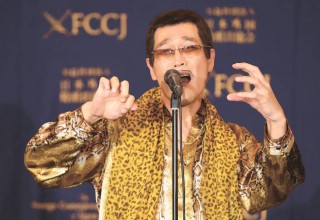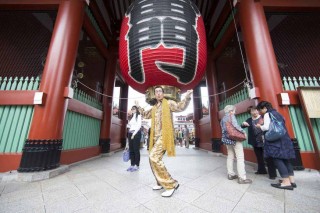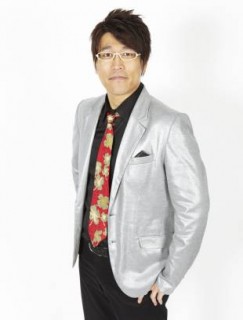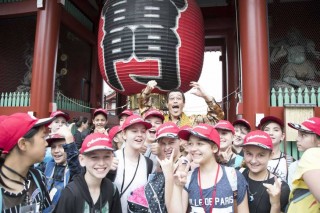Loading
Search
▼ ‘PPAP’ Goes The World: How Pikotaro Became a Viral Smash
- Category:Other
Pikotaro still can’t believe it all. Two days before he sits down with The Japan Times, the performer saw that American DJ duo The Chainsmokers had changed their Twitter name to “Pineapple & Pen,” a nod to his song “PPAP.” That pair previously claimed YouTube’s most popular clip with “Closer” — until Pikotaro’s 45-second ditty took the top spot.
“Is that real? Is that really their account?” he asks me midway through our interview. I assure him that it’s authentic, and for a split second he looks surprised. Just another highlight in a surreal month.
Pikotaro is a character created and played by Kazuhito (aka Daimaou) Kosaka, a comedian who has been grinding away in Japan’s entertainment industry for more than two decades. He has long been a mid-tier act, notable enough to appear in Seven-Eleven commercials and guest on variety shows, but has never held the spotlight. On the Thursday night we meet, however, he commands it. Decked out in his signature golden animal-print clothes and with a scribbled-on mustache, the staff on the 39th floor of his management company Avex’s Roppongi office appear to be completely centered on him. And his surprise hit song.
“I think the only way I could get this level of attention without ‘PPAP’ would be by starting a war,” Pikotaro jokes. “PPAP” stands for
“Pen-Pineapple-Apple-Pen,” which you probably knew already unless you’ve been living completely off the grid recently. The silly song — about pieces of fruit uniting with writing implements, set over a sparse beat — went viral in late September. Canadian pop juggernaut Justin Bieber called it his “favorite video on the internet,” which ushered in what Pikotaro refers to as “the Justin Impact.” Korean pop stars, Olympic athletes and Indonesian police are just some of the people to cover or parody the track. English teachers in Japan — peace be with you these coming months.
As of now, the official video has more than 70 million views on YouTube. But the reach of “PPAP” extends well beyond Pikotaro’s channel. The clip has been shared on Twitter and Facebook, racking up millions more views. A different YouTube channel uploaded the same clip — and has earned more than 145 million clicks. Don’t ignore the remixes and goofs either. The song had been YouTube’s top music video for three weeks, and crashed onto the Billboard Top 100, at No. 77, making it the shortest song to ever chart (nabbing Pikotaro a Guinness World Record in the process).
No song or comedy bit out of Japan has been more wide-reaching in the social media age.
“I used to only see Japanese on my Twitter, but after Bieber shared it — English, French, Chinese! I was confused,” he says, letting out an exaggerated scream. “Arabic, too. My computer couldn’t even display Arabic characters!”
Avex is trying to squeeze the most it can out of the situation. Pikotaro recently shared a new “extended” version of “PPAP,” and has an album due in December. T-shirts and keychains have been made, and a “PPAP”-themed cafe opened last week at Tokyo Skytree. Pikotaro jokes that the biggest change to his life has been a lack of sleep. When a member of his promotion team tells me the same thing, I realize how serious things have become.
As of now, the official video has more than 70 million views on YouTube. But the reach of “PPAP” extends well beyond Pikotaro’s channel. The clip has been shared on Twitter and Facebook, racking up millions more views. A different YouTube channel uploaded the same clip — and has earned more than 145 million clicks. Don’t ignore the remixes and goofs either. The song had been YouTube’s top music video for three weeks, and crashed onto the Billboard Top 100, at No. 77, making it the shortest song to ever chart (nabbing Pikotaro a Guinness World Record in the process).
No song or comedy bit out of Japan has been more wide-reaching in the social media age.
“I used to only see Japanese on my Twitter, but after Bieber shared it — English, French, Chinese! I was confused,” he says, letting out an exaggerated scream. “Arabic, too. My computer couldn’t even display Arabic characters!”
Avex is trying to squeeze the most it can out of the situation. Pikotaro recently shared a new “extended” version of “PPAP,” and has an album due in December. T-shirts and keychains have been made, and a “PPAP”-themed cafe opened last week at Tokyo Skytree. Pikotaro jokes that the biggest change to his life has been a lack of sleep. When a member of his promotion team tells me the same thing, I realize how serious things have become.
Yet the 43-year-old comedian isn’t feeling too much pressure.
“I’m too old to be planning for something to be a big hit,” he says. “I just want to keep making funny, happy videos.”
Like anyone who has been plugging away in their field for years without getting their due, he’s happy to revel in the unexpected spotlight.
“I’m the king of luck,” he says.
Born in Aomori prefecture in 1973, Kosaka cofounded the comedy outfit Sokonuke Air-Line in 1992. Initially a trio, the group experienced its most attention as a duo starring Kosaka and Shinobu Kojima. They landed on the sort of programs where dozens of groups deliver pun-heavy skits to a live audience. Echoes of “PPAP” even emerged in a bit called “Techno Taisou,” which found the duo dancing over a sparse drum machine beat.
Pikotaro says his producer, comedian Kazuhito ‘Daimaou’ Kosaka, is into a lot of Western music including Underworld, Kraftwerk and M.I.A.”Kosaka was influenced by a lot of music — The Prodigy, Underworld, Chemical Brothers. We have similar taste in music,”
Pikotaro says (he’s in character, but gracious in answering questions about his “producer” Kosaka). Japanese comedy and music have long intersected — comedy trio Snakeman Show appeared all over Yellow Magic Orchestra’s third album while no shortage of Japanese comedians have attempted serious musical crossovers — and with Kosaka it is no different. He started the techno unit No Bottom! in 2003, merging manic beats and squelchy synths with traditional Japanese sounds. The songs floating around YouTube can be funny, but at times come off at serious stabs at songwriting in the vein of Atari Teenage Riot.
“I’m too old to be planning for something to be a big hit,” he says. “I just want to keep making funny, happy videos.”
Like anyone who has been plugging away in their field for years without getting their due, he’s happy to revel in the unexpected spotlight.
“I’m the king of luck,” he says.
Born in Aomori prefecture in 1973, Kosaka cofounded the comedy outfit Sokonuke Air-Line in 1992. Initially a trio, the group experienced its most attention as a duo starring Kosaka and Shinobu Kojima. They landed on the sort of programs where dozens of groups deliver pun-heavy skits to a live audience. Echoes of “PPAP” even emerged in a bit called “Techno Taisou,” which found the duo dancing over a sparse drum machine beat.
Pikotaro says his producer, comedian Kazuhito ‘Daimaou’ Kosaka, is into a lot of Western music including Underworld, Kraftwerk and M.I.A.”Kosaka was influenced by a lot of music — The Prodigy, Underworld, Chemical Brothers. We have similar taste in music,”
Pikotaro says (he’s in character, but gracious in answering questions about his “producer” Kosaka). Japanese comedy and music have long intersected — comedy trio Snakeman Show appeared all over Yellow Magic Orchestra’s third album while no shortage of Japanese comedians have attempted serious musical crossovers — and with Kosaka it is no different. He started the techno unit No Bottom! in 2003, merging manic beats and squelchy synths with traditional Japanese sounds. The songs floating around YouTube can be funny, but at times come off at serious stabs at songwriting in the vein of Atari Teenage Riot.
Music and comedy, though, never resulted in a hit for Kosaka. He was good enough to land with Avex and impress other performers, but he was never able to generate a notable catchphrase or novelty song, let alone shine on his own. Successful, but unheralded. Kosaka kept at it, and created Pikotaro for live comedy shows in recent years.
“Not many people come to my live shows,” Pikotaro jokes when asked why he gravitated to YouTube, though clips online bear this out. He started a channel in late August, with the intent of posting new songs. “PPAP” came first.
“I was working on tracks — I made many tracks, like ‘kawaii‘ (cute) track, ‘cool’ track, ‘dance’ track. I was humming and singing words — ‘hmmm, cake, punch, punch, cake.’ ” Pikotaro sing-speaks.
The story behind “PPAP” goes that Pikotaro, while holding a pen, eyed one of the many Aomori Prefecture apples Kosaka had left lying around. He put the two together and — “uhhh, apple pen.” A can of pineapples from the night before provided inspiration for the rest.
“I approach it like, don’t think about it too much, and just enjoy the rhythm of the words,” he says. That simplicity carries over to his instruments: “PPAP’s” music was made with Roland’s MC-303 and MC-808 grooveboxes, and organized in the audio workstation Logic Pro.
Pikotaro talks a bit about the artists he respects such as Kraftwerk (for its digital repetition) and M.I.A. (who created most of her debut album with a set up not too different from Pikotaro’s).
“I really want to imitate the skill of those artists, but I can’t — I try to, but then I hit a barrier.”
The secret to comedy is timing. Social media allows memes to manifest and spread rapidly — and simple always wins. Japanese comedians have benefitted from this: recently, tunes from Kumamushi and Radio Fish turned the jokesters into viral stars, but only spread domestically. “PPAP” went worldwide.
“When I first saw it, I thought it was weird but I played it five times nonstop. It was just addictive,” says Lillian Leong, Chief Operating Officer of Hong-Kong-based online content aggregator 9Gag. Although the song had been gaining steam before the video was posted to the site’s Facebook page in late September [see sidebar], 9Gag blew it up. Its upload now sits at 69 million views.
“It’s simple and fun. Simple beat, basic elements — what’s more basic than pen, pineapple and pen?” Leong says.
Pikotaro thinks the track succeeded for three reasons.
“First, it’s in English. Fully in English. Second, ‘pa pi pu pe po’ feels good to say,” he shares, repeating those syllables over and over again. And third, he thinks nobody has ever made something as goofy as “PPAP” before.
It’s perfect for the internet of 2016, where reaction and re-creation drive content (having a fun and easy dance helps, too). And even though he knows it probably won’t happen again, long-overlooked Kosaka managed to break records and reach millions of ears — not to mention swipe attention away from J-pop titans SMAP and Hikaru Utada — with a gleefully wacky song highlighting the anything-goes style of the web at its best.
“The key is to do things every day. Even if you aren’t sure if you can succeed one day, you have to keep doing it,” he says. He believes that, if you keep at it, you’ll eventually generate a chance to go somewhere bigger.
“Even though you don’t know when it happens, you always need to be ready to glide with the unexpected. Kosaka told me that,” Pikotaro says, grin on his face. “I don’t know anything about that.”
“Not many people come to my live shows,” Pikotaro jokes when asked why he gravitated to YouTube, though clips online bear this out. He started a channel in late August, with the intent of posting new songs. “PPAP” came first.
“I was working on tracks — I made many tracks, like ‘kawaii‘ (cute) track, ‘cool’ track, ‘dance’ track. I was humming and singing words — ‘hmmm, cake, punch, punch, cake.’ ” Pikotaro sing-speaks.
The story behind “PPAP” goes that Pikotaro, while holding a pen, eyed one of the many Aomori Prefecture apples Kosaka had left lying around. He put the two together and — “uhhh, apple pen.” A can of pineapples from the night before provided inspiration for the rest.
“I approach it like, don’t think about it too much, and just enjoy the rhythm of the words,” he says. That simplicity carries over to his instruments: “PPAP’s” music was made with Roland’s MC-303 and MC-808 grooveboxes, and organized in the audio workstation Logic Pro.
Pikotaro talks a bit about the artists he respects such as Kraftwerk (for its digital repetition) and M.I.A. (who created most of her debut album with a set up not too different from Pikotaro’s).
“I really want to imitate the skill of those artists, but I can’t — I try to, but then I hit a barrier.”
The secret to comedy is timing. Social media allows memes to manifest and spread rapidly — and simple always wins. Japanese comedians have benefitted from this: recently, tunes from Kumamushi and Radio Fish turned the jokesters into viral stars, but only spread domestically. “PPAP” went worldwide.
“When I first saw it, I thought it was weird but I played it five times nonstop. It was just addictive,” says Lillian Leong, Chief Operating Officer of Hong-Kong-based online content aggregator 9Gag. Although the song had been gaining steam before the video was posted to the site’s Facebook page in late September [see sidebar], 9Gag blew it up. Its upload now sits at 69 million views.
“It’s simple and fun. Simple beat, basic elements — what’s more basic than pen, pineapple and pen?” Leong says.
Pikotaro thinks the track succeeded for three reasons.
“First, it’s in English. Fully in English. Second, ‘pa pi pu pe po’ feels good to say,” he shares, repeating those syllables over and over again. And third, he thinks nobody has ever made something as goofy as “PPAP” before.
It’s perfect for the internet of 2016, where reaction and re-creation drive content (having a fun and easy dance helps, too). And even though he knows it probably won’t happen again, long-overlooked Kosaka managed to break records and reach millions of ears — not to mention swipe attention away from J-pop titans SMAP and Hikaru Utada — with a gleefully wacky song highlighting the anything-goes style of the web at its best.
“The key is to do things every day. Even if you aren’t sure if you can succeed one day, you have to keep doing it,” he says. He believes that, if you keep at it, you’ll eventually generate a chance to go somewhere bigger.
“Even though you don’t know when it happens, you always need to be ready to glide with the unexpected. Kosaka told me that,” Pikotaro says, grin on his face. “I don’t know anything about that.”
- November 5, 2016
- Comment (0)
- Trackback(0)





